p.167
p.171
p.177
p.183
p.190
p.196
p.201
p.206
p.210
The Effect of Hot Tearing in Semi Solid Casting of Aluminum A201 Alloy
Abstract:
The effects of rheocasting times on the hot tearing defect in semi-solid die casting of aluminum A201 alloy have been investigated. This study found that no hot cracking formed in the semi-solid A201 alloy parts at a rheocasting time of 10 seconds, implying that the hot tearing suscepability (HTS) index value is zero. Moreover, the HTS index values for all semi-solid casting conditions were lower than those found in conventional casting samples. The microstructure of the as semi-solid casting parts consisting of non-dendritic structures and smaller grain size helped to improve the hot tearing resistance of aluminum A201 alloy. These results support the feasibility of semi-solid die casting of aluminum A201 alloy by using Gas Induced Semi-Solid (GISS) technique.
Info:
Periodical:
Pages:
190-195
DOI:
Citation:
Online since:
August 2013
Authors:
Keywords:
Price:
Сopyright:
© 2013 Trans Tech Publications Ltd. All Rights Reserved
Share:
Citation:


